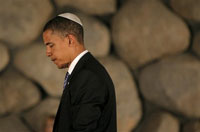Barack Obama’s visit to Palestine shows no sings of change
Palestinian President Mahmoud Abbas wants Barack Obama to take away one message from their meeting Wednesday - if elected U.S. president, he should focus immediately on the Israeli-Palestinian conflict or any gains made in peace talks could vanish.

Obama, the presumptive Democratic candidate, met with Abbas at the Palestinian leader's government headquarters in the West Bank. He shook hands with an Abbas aide and then entered the building.
Security was tight, with helmeted riot police carrying truncheons and rifles lining the access road to the walled compound.
During a stop in Jordan on Tuesday, Obama had suggested that he was open to the Palestinians' request. He said he'd do his best to bring Israelis and Palestinians together, "starting from the minute I'm sworn into office." However, he also cautioned that it is "unrealistic to expect that a U.S. president alone can suddenly snap his fingers and bring about peace in this region."
The candidate's visit in the West Bank generated some goodwill here, particularly since his Republican rival, John McCain, did not visit the Palestinians in a Mideast trip earlier in the summer. A Ramallah baker said he's named a bagel after Obama, to thank him for not ignoring the Palestinians.
Like people elsewhere in the region, Palestinians are fascinated with the U.S. campaign. The success of a black candidate may also have helped improve the tarnished U.S. image in the eyes of some.
Wael Hamad, a 35-year-old mechanic from Ramallah, said he expected Obama, who is black, to be more understanding of Palestinian suffering because of the hardships suffered by blacks in the United States.
However, deep skepticism about U.S. policy prevailed.
Most Palestinians believe the U.S. is so irrevocably biased toward Israel that it will make little difference whether Obama or McCain is elected U.S. president, said pollster Jamil Rabbah.
"The American interest has always been with Israel, not with us," said 22-year-old college student Mohammed Hatem. "We have seen a lot of (U.S.) leaders who say they are going to work to get the Palestinian people an independent state, and they end up serving Israel."
Obama deepened those fears in a speech to American Jewish leaders in June when he said Jerusalem must remain Israel's undivided capital - even though no U.S. government has recognized Israel's 1967 annexation of east Jerusalem, the sector claimed by the Palestinians as their future capital.
Obama later clarified that he believes the future of Jerusalem is to be determined in negotiations - Washington's longstanding policy. The fate of the city is currently on the table in U.S.-backed Israeli-Palestinian peace talks.
Kadoura Fares, a legislator in Abbas' Fatah movement, said Obama's slip-up on such a key issue caused serious damage. "His correction was not enough," Fares added. "He should have said he recognizes the Palestinian right to freedom."
The Islamic militant Hamas group, which rules the Gaza Strip, said Obama was not welcome and criticized Abbas, a bitter rival, for receiving him. "Obama wants to go to the White House through Tel Aviv, at the expense of the Palestinians," said Fawzi Barhoum, a Hamas spokesman.
Abbas aides insist the Palestinian leader's meeting with Obama offers an important opportunity.
Abbas will list Palestinian grievances, including Israel's continued settlement construction and refusal to ease restrictions on the movement of Palestinians in the West Bank, Foreign Minister Riad Malki said.
Abbas will also tell Obama that, if elected president, he must not waste time and must immediately turn his attention to the Israeli-Palestinian conflict, said Saeb Erekat, an Abbas adviser.
Israeli and Palestinian negotiators are trying to reach a peace deal by the end of President Bush's term. However, progress has been slow and both sides have said it's likely the target date will not be met.
In this case, immediate involvement by the next president would be crucial to preserve what has already been achieved, the Palestinians plan to tell Obama. The two sides have started drafting, though so far it has mostly meant writing down their differences.
Abdullah Abdullah, a former Palestinian deputy foreign minister, said he thinks Obama's visit to Ramallah is a positive sign. "It means that if elected president, the Mideast file will be on his (Obama's) desk from day one," Abdullah said hopefully.
President Bush, like President Bill Clinton before him, had largely stayed clear of the messy Mideast conflict during their first years in office.
Subscribe to Pravda.Ru Telegram channel, Facebook, RSS!


